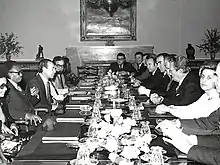Angola–Yugoslavia relations
Angola–Yugoslavia relations were historical foreign relations between Angola and now split-up Socialist Federal Republic of Yugoslavia. During the Cold War both countries actively participated in the work of the Non-Aligned Movement. Yugoslavia officially recognized the independence of Angola just one day after it was declared in 1975.[1]
Angola |
Yugoslavia |
|---|---|
.svg.png.webp)


At the time of the Portuguese Colonial War Yugoslavia provided military and other forms of aid to MPLA and other liberation movements.[2] Yugoslav support to decolonization movements in Africa affected Yugoslav relations with superpowers but was also motivated by its rivalry with Cuba over the leadership in the Non-aligned movement.[2] In 1976 President of Yugoslavia Josip Broz Tito explicitly endorsed Cuban intervention in Angola despite the opposition from the United States.[3] President of Angola Agostinho Neto visited Yugoslavia on three occasion in 1968, 1971 1973 and 1977 while Prime Minister of Angola Lopo do Nascimento visited Yugoslavia in 1976.[4]
See also
Further reading
- Natalija Dimić. (2017) Achievements and Limitations of Yugoslavia’s Policy in Angola during 1960s and 1970s. Afriche e orienti. Volume: XIX Issue: 3. ISBN 8860861462
References
- "Парламентарци из Анголе одушевљени храброшћу српског народа". Strength of Serbia Movement. 6 February 2020. Retrieved 20 December 2020.
- Lazić, Milorad (2019). "Comrades in Arms: Yugoslav Military Aid to Liberation Movements of Angola and Mozambique, 1961–1976". In Dallywater, Lena; Saunders, Chris; Fonseca, Helder Adegar (eds.). Southern African Liberation Movements and the Global Cold War ‘East’: Transnational Activism 1960–1990. Walter de Gruyter GmbH & Co KG. ISBN 9783110642964.
- "Castro, on Visit, Wins the Backing of Tito on Angola". The New York Times. 9 March 1976. Retrieved 20 December 2020.
- R. Radonić, Nemanja (2020). Слика Африке у Југославији (1945-1991) (PDF) (Doctoral Thesis). University of Belgrade. Retrieved 1 November 2020.
